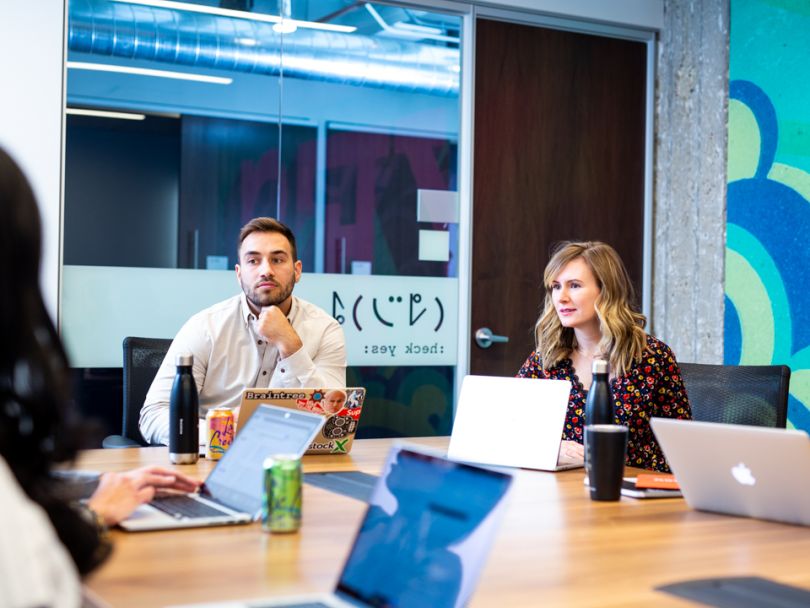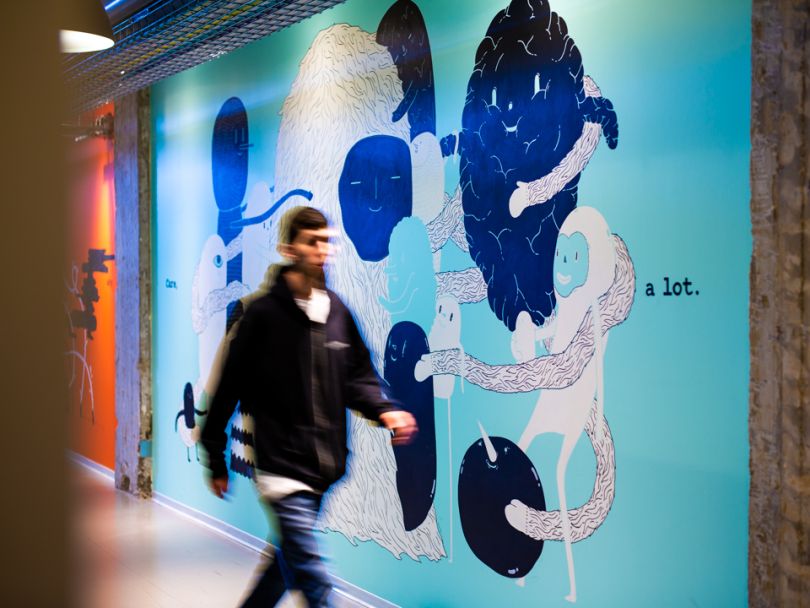Sometimes, not focusing on your work can be a professional benefit.
Technologists at payments technology company Braintree, a PayPal service, can attest: During Open Dev Days, which happen on alternating Fridays, team members have the chance to indulge their technological passions.
“It’s a time where you can say, ‘I want to take time to read articles about this, or watch conference videos about this topic and understand it at a deeper level,’ without the pressure of needing to finish some feature by a certain deadline,” iOS Engineer Susan Stevens said. “It’s blocked-off time to take a step back and use it however you need to.”
The initiative is just one component of a larger engineering environment where, as Stevens describes, avenues for knowledge-swapping and learning are plenty. That culture is further mirrored through practices like pair programming, and internal events like ProdConf, where teammates deliver talks on the tech and work that they’re tackling.

In her more than year and a half at the PayPal-owned company, Stevens said her knowledge base has deepened considerably, enabling her to apply her learnings to further Braintree’s goal: equipping merchants with simple, turnkey tools for processing payments.
“At Braintree, everyone is kind of a generalist to a certain degree, so there’s a lot of opportunities to pick up and work on things that you’ve never worked on before,” she said.
As Stevens recently told Built In Chicago, a culture that encourages ongoing learning and the autonomy to explore and navigate new technological challenges translates into success at the fintech organization.
Tell me a little bit more about the work that the SDK team does. What’s the purpose of that team and why is it critical to the organization?
Our team is responsible for Braintree’s client and server SDKs. The SDKs are one of the primary ways that merchant developers connect their apps, websites and server applications to Braintree functionality to process online payments. The client SDKs allow merchants to securely collect payment information from their customers, like credit card information or a customer authorizing their PayPal account to be used or Apple Pay or Google Pay. Any payment method that Braintree offers, the SDKs can be used to collect that information from a customer.
Then, we have server SDKs for six different server languages and frameworks. The server SDKs allow merchants to complete those transactions. Once they’ve collected payment information, they can actually use that information to move money to charge their customers. They can also use the server SDKs to do things like issue refunds, handle disputes and manage subscriptions. The SDKs make it as easy as possible for merchant developers to integrate with Braintree and collect payment information and process transactions.
We want to abstract away as much complexity as possible, boil it down to these very simple components and give merchants the building blocks to do whatever it is that their specific website or application needs, without having to know about everything that’s going on behind the scenes at Braintree.
At a topline level, how would you describe the company culture?
It’s very collaborative and very flexible. There’s a lot of freedom for teams to come up with their own ways of working and figure out what’s the most effective for the people on that team and that moment. People can come up with new ways of doing things and try them out — there’s no one telling you not to try something new.

Your team practices pair programming. Are there any success stories that have come out of that?
We had a new feature that we wanted to add to the GraphQL API at one point that was going to be used in the SDKs. We did some cross-pairing with the team that owns that API. I had never worked with GraphQL before, and I certainly didn’t understand how the API was implemented at Braintree. But the engineer I paired with was able to walk me through adding this pretty simple feature. I was also able to tell him, ‘Here’s what we’re doing on the SDK side, here’s why we’re building this out,’ and share knowledge across teams. That was a valuable use of pairing time.
There are a lot of opportunities to pick up and work on things that you’ve never worked on before.”
In what other ways does collaboration come through?
We do an internal Braintree conference every year, ProdConf, where engineers can sign up to give talks about a particular technology or particular language that they have learned about and want to share. Going forward, that makes it easier to know who to reach out to for questions.
For example, at one of them, there was a developer who had started out on the support team and then transitioned into a technical role. They talked about some of the challenges and communication between developers and support and how we can bridge that gap. Hearing the perspective of somebody who works on support, and is dealing with merchant communications all day, was really helpful.
Expanding the Base
What else do you think makes the engineering culture unique?
With Open Dev Days every other Friday, you have a day to spend however you want: learning something new, working on a side project or even working on something that you want to improve on your team’s codebase that might not be on the top of the list of priorities, but it’s something that you’re interested in.
It gives me a day to refresh and work on something that’s going to make me feel energized or dive deeper into a topic that I’m interested in. It gives me an opportunity to do something that’s going to make me feel excited about work at times when things are more stressful.
People can come up with new ways of doing things and try them out.”
Lastly, why might a talented individual want to join the team?
There’s also a really good work-life balance. People aren’t working 60-hour weeks or working every weekend. It’s very well-understood that people have families and lives outside of work, and that’s valuable.
You get to work with people who genuinely care about the product that they’re building, which is being used by people worldwide. You have an opportunity to have a huge impact and to work with people who are really smart and care a lot.







